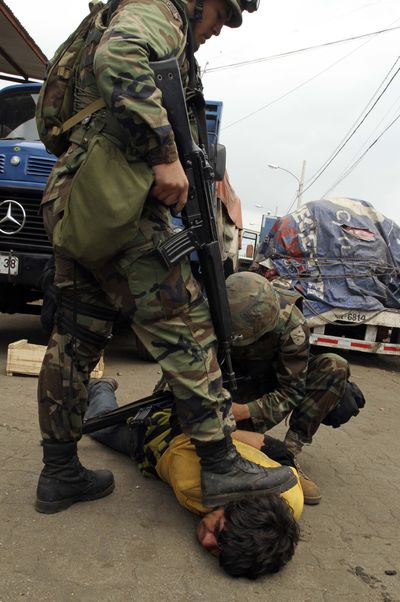Chilean military imposing order
Food, water still scarce; curfew begins

CONCEPCION, Chile – The Chilean army marched into this wrecked city Tuesday, rounding up looters and receiving the applause of besieged survivors of the weekend’s massive earthquake.
Despite Chile’s tortured history with the military, the armed forces now are being looked at by many here as their savior – a necessary, if slow-in-coming, show of force in the face of utter disaster and deteriorating security.
“They should have done this a long time ago,” civil engineer Carlos Aguilar, 42, said as soldiers armed with M-16s pulled a group of young thieves from a disheveled Cruz Verde pharmacy and loaded them into the back of a van. The crowd that gathered applauded and shouted words of thanks. “If they need to, they should shoot to kill,” Aguilar added, echoing the sentiments of numerous people here.
Marlene Elizabeth Franco, a 39-year-old mother of three, said roving bands of vandals had been terrifying neighborhoods in the aftermath of the magnitude 8.8 quake that roared through central and southern Chile before dawn Saturday, killing at least 800 people.
“It feels like we are living in a war zone,” she said through tears, recounting the dark, sleepless nights in which her husband and others stand guard, armed with sticks and clubs against “thieves and vandals with pistols.”
“I believe in democracy,” she continued, “but right now we have complete disorder. It is important to have a police and army presence on the streets.”
A pall of acrid smoke hung over Concepcion on Tuesday after vandals torched a downtown shopping center on Monday – once they had finished clearing it of goods. Looting here in Chile’s second-largest city, combined with mounting protests over the lack of food, water and aid, alarmed the government of President Michelle Bachelet and prompted authorities to prolong an overnight curfew to noon Tuesday.
“Our concern is to give security and calm to the population,” Bachelet said Tuesday after announcing that nearly 14,000 army and navy troops had been deployed throughout quake-devastated coastal communities.
Bachelet said 50 military flights with supplies were headed to the region Tuesday. But they were not immediately in evidence. Most of the zone remained without electricity or running water, with food and fuel acutely scarce. In places where staples like bread were available, residents complained of soaring prices.
Within the first 48 hours of the temblor, one of the strongest recorded, Bachelet declared a state of emergency in the hardest-hit regions, putting them under military control, deploying troops and instituting a curfew.
For some Chileans, the extreme measures were a throwback to the darkest moments of their national history.
It was the first time such measures were taken in the 20 years since democracy was restored to Chile, after decades of brutal military dictatorship led by Gen. Augusto Pinochet.